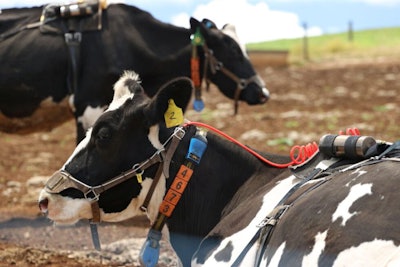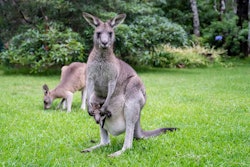
AUD2.93 million will support large-scale dairy and beef grazing trials of low-emission feed supplements
The Australian federal government has awarded GrainCorp AUD2.93 million (US$1.95 million) in funding to support large-scale dairy and beef grazing trials of low-emission feed supplements.
The grant will support the agribusiness’ large-scale trials to test methane emissions reduction and productivity impacts from sustainable feed solutions, including Asparagopsis seaweed supplements, for livestock.
The funding was awarded in the third round of the government’s Methane Emissions Reduction in Livestock (MERiL) program, supported by the Minister for Agriculture, Sen. Murray Watt, and the Minister for Climate Change and Energy, Chris Bowen MP.
The trials involve the cattle wearing devices called SF6, which measures the methane emitted from the cow.
GrainCorp COO Klaus Pamminger says the government recognizes the importance of feed supplements in reducing methane emissions and is supportive of GrainCorp’s innovative practices.
“The trials will target pasture-based systems for the first time, and capture critical information to help us accelerate the development of the supplements,” he says. “GrainCorp is leveraging the knowledge of our experts to design feed solutions, lead world-class trials and meet the challenge of scaling up the production and adoption of sustainable feeds.”
In Australia, ruminant animals (beef, sheep and dairy cattle) contribute to up to 15% of greenhouse gas emissions each year – and the methane they produce is 28 times more potent than the carbon dioxide from your car.
GrainCorp is partnering with key industry leader FutureFeed on the project, which was established by the CSIRO to drive the commercialization of Asparagopsis solutions.
The first stages of the project were also supported by the MERiL program and have seen feed supplements tested in liquid, molasses, crumble and pellet forms to assist laboratory testing.
GrainCorp will engage with teams at the University of Queensland and Agriculture Victoria Services (AVS) to assist with the trial research.
“We’re proud to collaborate with the industry to provide a sustainable path forward for Australian livestock farmers,” Klaus says.
“Working with other leading research organizations allows us to bring the best minds together to help Australian farmers meet the Global Methane Pledge, to cut methane emissions by 30% by 2030.”
The trials will extend into 2024 to allow the teams to capture results over multiple seasons.














